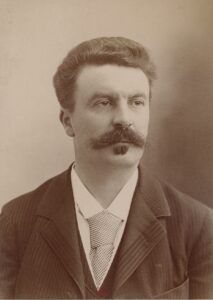Dual Language Short stories in French – Learning French through English
Aesop’s Fables – Le meunier, son fils et l’âne
Once upon a time, in a small quiet village, there lived a miller and his son. The miller had a donkey which he wanted to sell in the market. The market was in the next town.
TranslateIl était une fois, dans un petit village tranquille, un meunier et son fils. Le meunier avait un âne qu’il voulait vendre sur le marché. Le marché était dans la ville voisine.
So the miller and his son set off with the donkey to try and sell him for a good price. The father thought, “If we ride the donkey, he will become tired once he reaches the town. If the donkey looks tired, nobody will buy him and I shall look like a fool.”
TranslateAlors le meunier et son fils sont partis avec l’âne pour essayer de le vendre à bon prix. Le père a pensé: «Si nous montons sur l’âne, il se fatiguera une fois arrivé en ville. Si l’âne a l’air fatigué, personne ne l’achètera et je ressemblerai à un imbécile.»
So the miller and the son tied a rope around the donkey’s neck and the three of them walked towards the market.
TranslateAlors le meunier et le fils ont attaché une corde autour du cou de l’âne et tous les trois se sont dirigés vers le marché.
On the way towards the market, they saw a few travellers walking down the road. They said, “What fools! The father should ride the donkey as he is elderly. The son is young and should walk beside the father. The most stupid among the three is not the Ass perhaps.”
TranslateSur le chemin du marché, ils virent quelques voyageurs descendre la route. Ils ont dit: «Quels imbéciles! Le père devrait monter l’âne car il est âgé. Le fils est jeune et devrait marcher à côté du père. Le plus stupide des trois n’est peut-être pas l’âne.»
The father was very angry and climbed on top of the donkey. He said, “No one should call me a fool. I shall ride the donkey and my son will walk beside me.”
TranslateLe père était très en colère et a grimpé sur l’âne. Il a dit: «Personne ne devrait me traiter d’imbécile. Je monterai à dos d’âne et mon fils marchera à côté de moi.»
After some time, they saw a few more travellers walking down the road. They said, “What a cruel father! The father rides the donkey and his poor son is walking. The son is too young to walk and should ride the donkey. The father should walk beside the donkey.”
TranslateAprès un certain temps, ils ont vu quelques autres voyageurs marcher sur la route. Ils ont dit: «Quel père cruel! Le père monte l’âne et son pauvre fils marche. Le fils est trop jeune pour marcher et devrait monter à dos d’âne. Le père devrait marcher à côté de l’âne.»
The father was very angry and climbed down the donkey. His son climbed the donkey. He said, “No one should say that I am cruel. My son shall ride the donkey and I will walk beside him.”
TranslateLe père était très en colère et est descendu de l’âne. Son fils est monté sur l’âne. Il a dit: «Personne ne devrait dire que je suis cruel. Mon fils montera sur l’âne et je marcherai à côté de lui.»
After some time, they saw a few more travellers walking down the road. They said, “What fools! The son rides the donkey and his poor father is walking. The donkey can of course carry both of them. The most stupid among the three is not the Ass perhaps.”
TranslateAprès un certain temps, ils ont vu quelques autres voyageurs marcher sur la route. Ils ont dit: «Quels imbéciles! Le fils monte l’âne et son pauvre père marche. L’âne peut bien sûr les porter tous les deux. Le plus stupide des trois n’est peut-être pas l’âne.»
The father was very angry and asked his son to climb the donkey. He said, “No one should say that I am a fool. My son and I shall ride the donkey together.”
TranslateLe père était très en colère et a demandé à son fils de grimper sur l’âne. Il a dit: «Personne ne devrait dire que je suis un imbécile. Mon fils et moi monterons l’âne ensemble.»
After some time, they saw a few more travellers walking down the road. They said, “What cruel people! The donkey cannot carry both of them. Look at how badly it suffers. They should carry the donkey instead of the donkey carrying them!”
TranslateAprès un certain temps, ils ont vu quelques autres voyageurs marcher sur la route. Ils ont dit: «Quelles personnes cruelles! L’âne ne peut pas les porter tous les deux. Regardez à quel point il souffre. Ils devraient porter l’âne au lieu de l’âne qui les porte!»
The father became very angry and tied the donkey to a stick. Both the son and the father carried the donkey to the market. They soon reached the market.
TranslateLe père s’est mis en colère et a attaché l’âne à un bâton. Le fils et le père ont porté l’âne au marché. Ils ont rapidement atteint le marché.
In the market, everyone laughed at the two and said, “They are carrying the donkey. Perhaps it cannot walk. A donkey which cannot walk is useless. We shall not buy the donkey!”
TranslateAu marché, tout le monde s’est moqué des deux et a dit: «Ils portent l’âne. Peut-être qu’il ne peut pas marcher. Un âne qui ne peut pas marcher est inutile. Nous n’achèterons pas l’âne!»
And so, no one purchased the donkey from the father and the son. They returned back to their home, sad but wiser.
TranslateEt donc, personne n’a acheté l’âne du père et du fils. Ils sont retournés chez eux, tristes mais plus sages.
Moral: “If you try to please all, you please none.”
TranslateMorale: “Si vous essayez de plaire à tous, vous ne plairiez à personne.”
Hope you had fun learning the French language through short stories 🙂 If so leave a comment!!!
For more languages:
Learn German through Short stories: https://childhood-stories.com/German
Learn Spanish through Short stories: https://childhood-stories.com/Spanish
Learn Italian through Short stories: https://childhood-stories.com/Italian
Learn Dutch through Short stories: https://childhood-stories.com/Dutch
Learn French through Short stories: https://childhood-stories.com/French
Learn Portuguese through Short stories: https://childhood-stories.com/Portuguese
Learn Portuguese through Short stories: https://childhood-stories.com/English
About: Studying through Dual Language Short stories in French, an immersion technique is among the best techniques for learning a new language. The objective of this website is to teach yourself how to read and speak French confidently using English as a base 🙂
These French short stories are super cool to read for beginners and also for entertaining children. Aesop’s Fables are among the best stories that can be studied on a daily basis.




